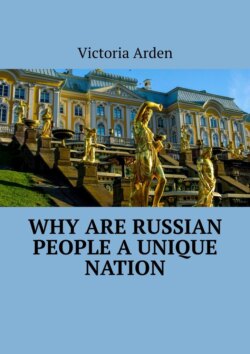Читать книгу Why are Russian people a unique nation - - Страница 3
Chapter 1: Historical Roots
ОглавлениеThe formation of the Russian nation is a complex and multilevel process that spans centuries and includes many key stages. The history of the Russian people is inextricably linked with their geography, climate and cultural interactions, which has created a unique context for the formation of national identity. One of the first significant stages in this history is Kievan Rus, which arose in the 9th century. It was the time when the first state formations began to form on the territory of the modern Eastern European space, uniting various tribes and peoples under a single political and cultural principle. Kievan Rus, with its center in Kiev, became an important cultural and commercial center where interaction between Slavs, Scandinavians and other peoples took place. The adoption of Christianity in 988 was an important milestone that not only strengthened political power, but also significantly changed the cultural image of the people, bringing new values, moral norms and traditions.
With the transition to the Moscow Principality in the 14th-15th centuries, a new stage in the history of the Russian nation begins. Russian Russian Principality became the center of unification of Russian lands, which contributed to the formation of a united Russian people. During this period, there was active resistance to foreign invaders, such as the Tatars, which played an important role in shaping national identity. Liberation from the Tatar yoke at the end of the 15th century became a symbol of strength and unity, strengthening the idea of Russia as a great and independent power. This time was also marked by a desire for centralized power, which later led to the formation of the Russian Empire.
Imperial ambitions and colonization in the 16th and 19th centuries significantly influenced the development of Russian identity. The expansion of borders, the conquest of new territories and interaction with various peoples have brought diversity to the cultural landscape of Russia. However, at the same time, internal contradictions arose related to colonial policy and attitudes towards indigenous peoples. Russian Russian ambitions led to the creation of the image of the «Russian World», which became a symbol of unity and solidarity of the Russian people, but also caused controversy and discussion about what it means to be a part of the Russian nation.
The impact of these historical events on the national identity of the Russian people cannot be overestimated. The formation of a united people took place against the background of complex political and social changes, which contributed to the creation of a special mentality based on perseverance, patriotism and the desire for unification. Over the centuries, Russian people have faced many challenges, which has only reinforced their sense of belonging to their people and culture. Each new stage in history has left its mark, forming values and traditions that continue to influence modern Russian society.
